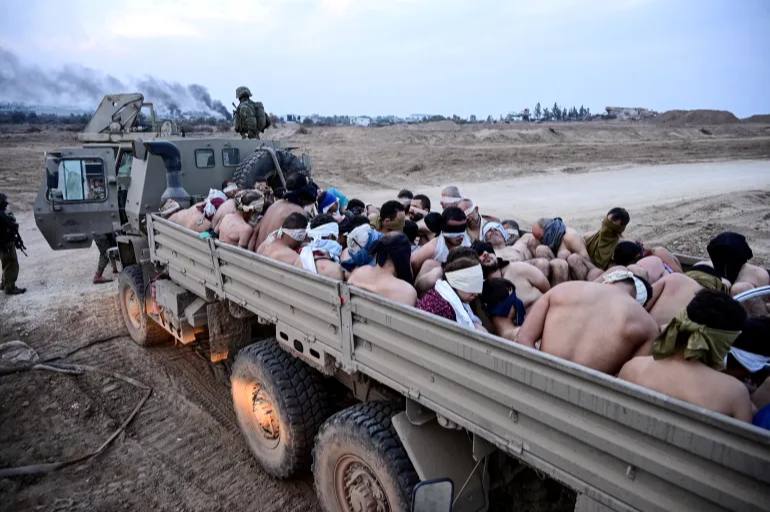A United Nations human rights official has called for an end to the mistreatment of Palestinian detainees by Israeli security forces in the Gaza Strip, who were subjected to weeks of imprisonment in unknown locations and physical abuse.
Palestinian men were held by Israeli forces for between 30 to 55 days, Ajith Sunghay said in a report on Friday during his visit to Gaza, where he met some of the released detainees.
“There are reports of men who are subsequently released, but only in diapers without any adequate clothing in this cold weather,” he said, adding that it was not clear why they were made to wear diapers but that “they were clearly visibly shocked and even shaken when I met them.”
Several videos shared by the Israeli army since the war began show hundreds of Palestinian men stripped to their underwear, sitting outdoors in the cold, sometimes blindfolded. In a few videos, women and children were also seen. The videos were taken at locations across Gaza, including Beit Lahiya, Shujayea and Jabalia.
According to the Euro-Med Human Rights Monitor, multiple freed prisoners said that after being made to curse themselves and disparage Palestinian groups and political figures, they were transferred in trucks to open-air detention facilities where they endured beatings and other forms of mistreatment.
“Israel must take urgent steps to ensure that all those arrested or detained are treated in line with international human rights and international humanitarian law norms and standards, notably with full respect for their due process rights,” Sunghay asserted.
“Unless Israel can demonstrate imperative security grounds for each person remaining in detention, they must be charged or released.”
Separately on Friday, several prisoners released by Israeli forces in Gaza arrived at the Abu Youssef Al Najjar Hospital in Rafah, southern Gaza, accusing the Israeli army of mistreating them. “We were arrested by a special Israeli force in the al-Saftawi area. We were then subjected to torture and beatings. Then they … transferred us to a detention centre at the Israeli army headquarters,” Muhammad Abu Samra told Al Jazeera.
“The army … threatened to shoot us while we were naked in the cold. Then female soldiers attacked us and we were subjected to obscene insults.”
The UN’s Sunghay, who was in Rafah, said people were continuing to arrive in southern city, “in desperate situations, setting up makeshift shelters with any material they can get their hands on.” “I’ve seen men and children digging for bricks to be able to hold in place tents made with plastic bags. This is a massive human rights crisis,” he said.
“It is a pressure cooker environment here, in the midst of utter chaos, given the terrible humanitarian situation, shortages, and pervasive fear and anger,” Sunghay noted, adding that there was an urgent need to scale up humanitarian aid for the coastal enclave.
As of Friday, 24,762 people have been killed and 62,108 injured in Israeli attacks on Gaza since the current conflict began in October, according to the Gaza Ministry of Health.


